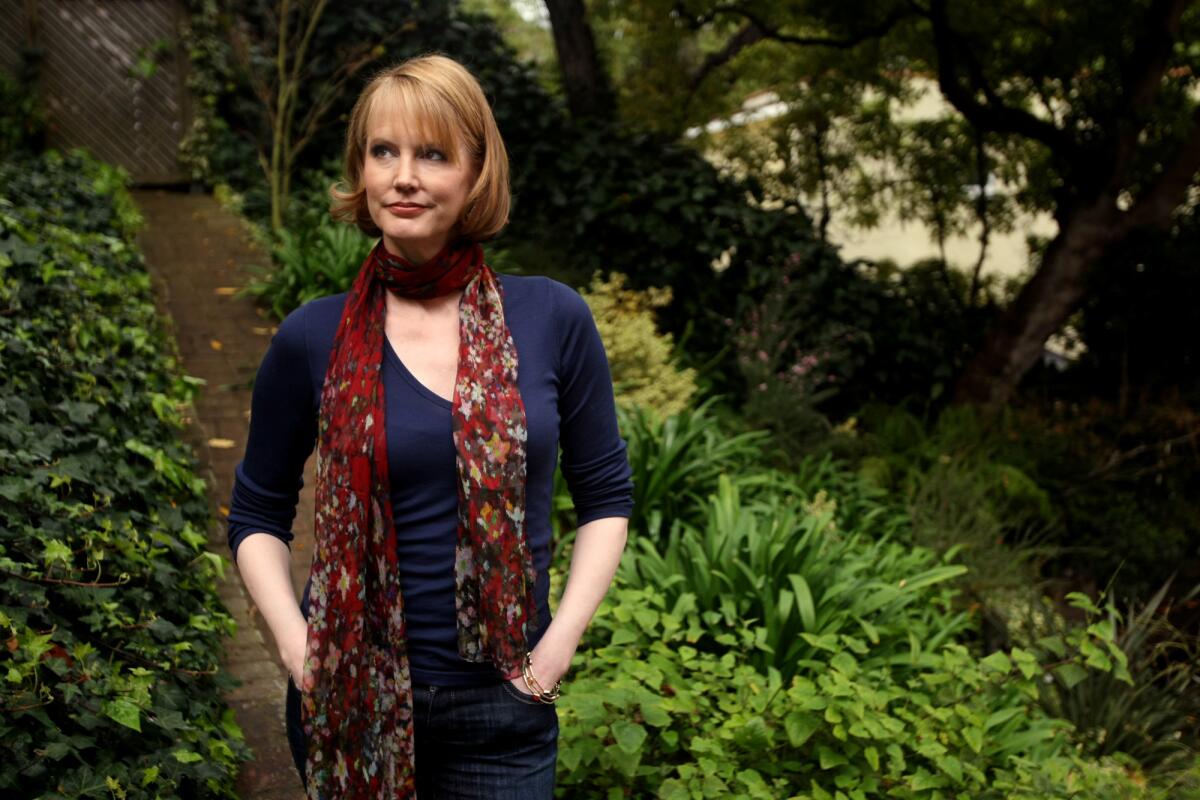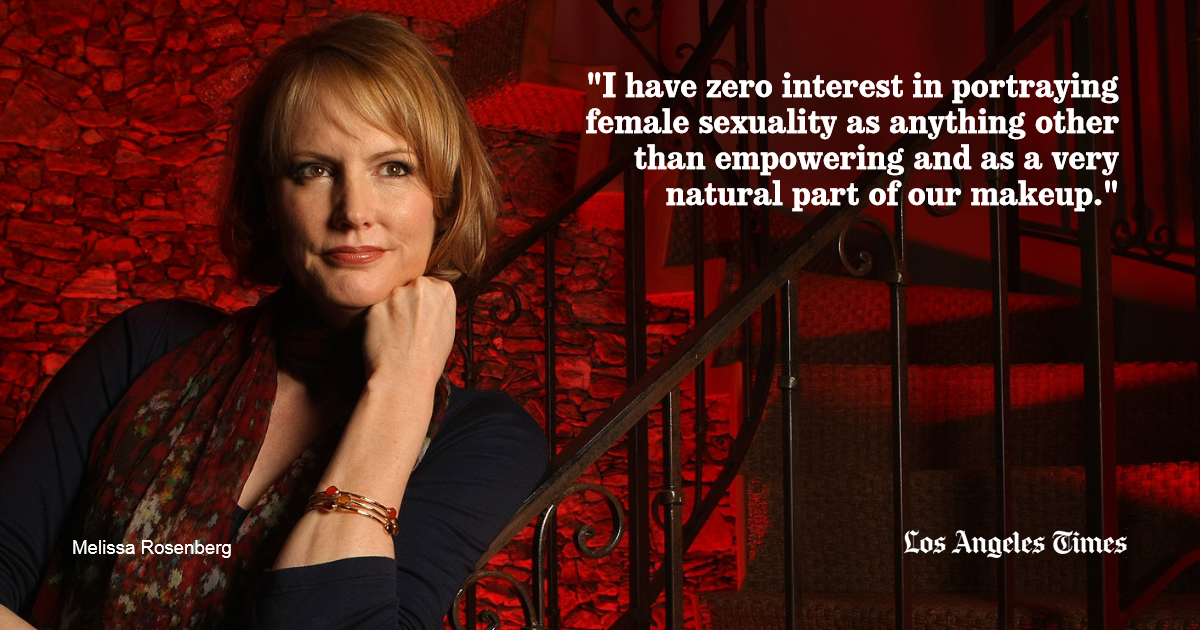Q&A: ‘Jessica Jones’ showrunner Melissa Rosenberg talks rape, adaptation, and female sexuality

Melissa Rosenberg, show-runner of Marvel’s “Jessica Jones” on Netflix.
- Share via
Melissa Rosenberg is no stranger to adaptations, having served as head writer on Showtime’s “Dexter” as well as crafting all four screenplays for the blockbuster “Twilight” films.
But Rosenberg has a new story to transform with Marvel’s latest television venture, “Jessica Jones.” The adaptation of the “Alias” graphic novels as written by Brian Michael Bendis just premiered its first season on Netflix.
Rosenberg spoke by phone about all things casting, the magic of Marvel, and why she had no interest in filming rape scenes.
SIGN UP for the free Indie Focus movies newsletter >>
How did your involvement with your project begin? I know it’s been a long process, but what was the impetus?
ABC Studios knew that I wanted to write a female superhero and they put me together with Jeph Loeb, head of Marvel TV, who brought me “Jessica Jones.” I was completely unfamiliar with it but the moment I laid eyes on the comic book by Brian Michael Bendis, I was all in.
Between ABC passing on the show and you finding a home at Netflix, how much did your conception of the show change?
It changes quite a bit for cable. It becomes more about continuing story lines than it does about case-of-the-week. Because you’re not a slave to commercials and a week in-between each episode, you have all that real estate you normally spend recapping, going to storytelling. So you find yourself really pushing the edges even further than you might otherwise.
Netflix is very much into pushing the edges. We went dark. We went to all the far reaches of the human psyche.
Did you always see Purple Man as your villain?
I always did. He was in the comic book and I really embraced that. It was such a delicious character and he has so much to do with Jessica’s own psyche and where we start with her, so I always wanted to pursue that.
The series deals with abuse, rape, and PTSD with such a deft hand. How important was nailing those elements to perfecting the overall tone of the show?
Playing them as honestly as possible was very much the objective from the beginning. The tone is meant to be very grounded and real, so you have to be very grounded and real with whatever subjects you’re dealing with. So there was no glossing this over. It was really an exploration of a survivor and her healing, to the degree that she does, in facing those demons quite literally.
From the outset, it was really wanting to treat the matter as directly as we could.
One of the most unnerving elements with Kilgrave is when he directs women to “Smile.” Given the state of modern feminism and the movement to allow women more body autonomy, how much of that framing is related to modern misogyny?
[Laughs.] Let’s see, 100%? I was very conscious to really take all that on. This is a character who is not defined by her gender. She is first and foremost a character. I didn’t define her any more as a woman as you would “white guy” if it was a white male lead. But those of us of the female persuasion, our lives are certainly informed by our gender and the misogyny around us. Her stories were definitely informed by it.
Television seems to struggle when it is tackling depictions of sex, both consensual and otherwise. Was it important for you to have a lot of sex-positive encounters on the show? Conversely, how did you make your choices regarding depicting or not depicting rape?
With rape, I think we all know what that looks like. We’ve seen plenty of it on television and I didn’t have any need to see it, but I wanted to experience the damage that it does. I wanted the audience to really viscerally feel the scars that it leaves. It was not important to me, on any level, to actually see it. TV has plenty of that, way too often, used as titillation, which is horrifying.
The show doesn’t shy away from portraying sex as a passionate, positive act. Was that important to you too?
It’s interesting, I’ve never thought of it as sex-positive as much as, again, real, grounded sexuality and the expression of it. I have zero interest in portraying female sexuality as anything other than empowering and as a very natural part of our makeup. I was not handling it with kid gloves. I’m not interested in these romantic, pretty, hand crawls up the back, thing. I really wanted a very visceral experience of these characters, it’s another facet of who they are.
Because it’s Jessica’s story, you’re experiencing it from her point of view. Between her and Jeri Hogarth and Trish Walker, these are all characters who are sexual beings like any other women and it was very much about allowing that to be the case. Again, just being honest with who these characters are.
Tell me a little about the casting process.
From the beginning, even when it was back at network, we had various lists and Krysten Ritter was always at the top of those lists. For one reason in particular, at the beginning, which was one of the most, if not the most, important element of this character was to be able to deliver a dryly comedic line. I knew we were going to be going into some bleak territory emotionally and there’s just no way to do that without offering some levity, for me. I have no interest in going there without a little bit of levity. And this character just allows for so much of that black comedy to come forward. That was essential.
Having been a fan of hers for a long time, I knew that was something she could do. Between then and when we actually did it at Netflix, her stint on “Breaking Bad” happened and I thought, “Oh, wow, she’s got some serious range.”
Plus, my husband, who’s a director, directed her on “Don’t Trust the B...” and he’d been incredibly impressed by her, both for her talent and for who she was.
That’s extremely important to me, that everybody who I work with, are they good human beings? Are they people who I’m going to want to come to work with every day. That’s just a huge factor.
“Is this a person I want to spend 16 hours a day with?”
You’re going to be so stressed. You’re going to be so uptight. The last thing you want to do is add a difficult person to that. But Krysten really was a dream and that was her reputation from my husband and her show-runner [Nahnatchka Khan] there.
When it came back around to present-day casting, she was one of the first people who came in and, doing our due diligence, we saw a lot of people, but she had already set the bar so high that no one else came close.
Because of the Marvel/Netflix deal making four shows, how did the casting of Mike Colter as Luke Cage go? Was it a committee?
The show-runner hadn’t come on yet for “Luke” and we did, between Marvel and Netflix and myself, we all went through the audition process with that character. In the end, I obviously deferred to them, saying, “Listen. I have this character for 13 episodes. You have him for many years, so go with who you’re happy with.” But in the end, there was no conflict on that one. It was very clearly Mike from way in the beginning.
Were there characters where there was conflict?
We had a hard time finding Malcolm. I had created Malcolm for an actor who I love, who I’d worked with before, and then he became unavailable. So now I had this great character and what am I supposed to do?
That took a long time to hunt down that particular character. Somehow we found Eka Darville, who ends up being the perfect actor for that role. He has such grace and vulnerability, but also goodness. You’re really with him and his kindness comes through in his performance.
In casting someone like David Tennant as your villain, was there ever a concern that maybe he wasn’t unlikable enough?
[Laughs.] No. I was never worried about that. No more so than I was worried about “Was Krysten likable enough?” When you have actors of that caliber, I knew that he could go to these dark places and I knew if we wrote him correctly, he would go to those places.
I didn’t want someone who was unlikable. I wanted someone who was delicious. Like Anthony Hopkins in “Silence of the Lambs.” You want someone you can really sink your teeth into and love to hate.
Jessica isn’t an antihero. If anything, she’s an antisuperhero, who uses basic film noir detective work to catch the bad guys, which makes her the inverse of so many current TV detective shows, where average men have preternatural powers of detection.
How did you come to this place where you’re making basically the opposite of every other detective show on television?
This is so much of what attracted me to this project and the character right from the get-go with Brian Michael Bendis’ book, this very grounded way, and it was important to me in creating the show to maintain this very grounded character for whom the superpowers are just a matter of fact. She doesn’t advertise them but she doesn’t deny them, she doesn’t hide them. It’s just who she is.
What I love about this character is she’s so unapologetically who she is. She’s unapologetic about her sexuality, about her powers, about her drinking, about just about anything. She’s just kind of who she is. Nor does she make a big deal of it. It’s just going through life. It’s very relatable and very grounded.
The audience isn’t necessarily rooting for Jessica to heal or change, so much as they’re rooting for her to keep being herself and being awesome at being herself. She’s not a “strong woman” trope, she just is who she is.
There is a healing process with the trauma that she’s gone through. But that’s still a part of who you are. You don’t become a different person because you’ve faced your demons. And who she is, is fantastic. We never want her to change that.
Wounds heal, but scars are forever.
Was it a burden at all to be the first person into the darker side of Marvel’s TV enterprises?
It was actually the opposite of a burden. It was new territory for them and Jessica Jones was a much-lesser-known character than any of the others. They really gave me free rein. I know they’ve gotten a reputation for the opposite on occasion, but I have to tell you, they were absolutely supportive of my vision. Jeph Loeb, who’s also a writer himself, was just a tremendous partner in shepherding this thing forward. There really weren’t a lot of boundaries on what I could or couldn’t do. Which really was awesome.
You’re so familiar with doing adaptations, how do you go about taking elements of a source material and making it your own?
Since the “Twilight” experience was kind of the opposite of “Jessica Jones” on so many levels, but certainly in pure structure and adaptation. With “Twilight” it was like, “How do I get this 500-page novel into a 110-page script?” With comics, there’s a very minimalist quality to them and there’s not a lot of story there to fill 13 hours.
What I’m constantly doing, what we did throughout the first 13 hours, you would take a nugget from the comic book and expand upon it. It’s like taking little short stories and turning them into films, so you’re constantly filling in.
We did that with “Dexter” as well. You have one novel and then you have 12 hours to fill in, so there’s just constant enriching, complicating, and finding interesting new connections.
From the original comics, which began in 2001, did you find that a lot of that material needed to be updated for modern audiences? Fifteen years may not seem like a long time, but culturally a lot has changed with how people interact.

Melissa Rosenberg
What I mostly used from the comics is the characters. The comics live in a different Marvel universe than the Marvel Cinematic Universe, so the mythology is different; so in the comic, everyone in the city is aware of superheroes and they’re an everyday thing and the entire subject is about humans vs. supers and that’s just not the world of the cinematic universe and definitely not the world here. So all of that storytelling goes away.
What remains is this character and her damage, so that changes in terms of having to create a three-dimensional version of her but that didn’t really change because he’s really beautifully drawn her, literally and figuratively.
During this process and the five years it took to come to fruition, did you ever receive any terrible notes that made you question what you were doing?
From Marvel, no. But you have to realize there was a three-year period where there was no word on it. It was dead as far as I knew. Meanwhile, Jeph Loeb is working behind the scenes to set up this incredible Netflix situation.
He’d call me every three or four months and say, “OK, I’m working on something. Are you free? Can you start working? Are you available?” and I’d be like, “Yeah, whatever, let me know,” and he’d say, “I’ll call you next week.” Four months go by. And this, I swear to God, I’m on a set in Toronto or wherever I am. Finally, after three or four of those calls, he calls and he says, “OK, if the press contacts you, just say you don’t know anything.” I’m like, “What the ---? I don’t! What are you talking about?” Then I found out he had set it up with Netflix.
If I had, in my own dreams, if I could have chosen the right place for it to be, I would have chosen Netflix.
How was it working within the Marvel Cinematic Universe? Were there certain elements that you couldn’t incorporate? I know that originally with ABC, Carol Danvers was going to be involved but I’m sure since she has a movie, theoretically, coming up, that got nixed.
That was the biggest shift, was losing Carol Danvers, but what ended up happening was we pulled from the Marvel universe Patsy Walker, who was from way back in the ‘40s. But there were just elements of her character that really lent themselves to a really interesting modern-day character and we ended up, I think, with actually a much better pairing than Carol Danvers would have been.
I think having someone who doesn’t have superpowers is a more interesting partner for Jessica as a best friend.
One of my favorite things about the show as a whole is how much it speaks to late 20-something, early 30-something women who are reaching a point in their lives where they’re like, “Oh, this isn’t what I wanted to do. My first try at life didn’t work out.” Do you recognize that in the show, the thematic resonance of the aimlessness of that age?
The age was very important. We were very clear from the beginning that we wanted someone who was exactly that age, because if they’re too young, they don’t have the experience, they don’t have the damage yet. This is a character who has been shaped by her personal history and has some back story.
But then, if they’re too old, if they’re in their late 30s, early 40s and have these kind of problems, you’re kind of going, “Wow. Get over it already. Move one.” Jeph Loeb talked about the sweet spot, like 31, and we just got incredibly fortunate that Krysten Ritter, we caught her at the age we did.
Man, it was just meant to be.
It was just meant to be. It seriously was.
--
Follow me on Twitter at @midwestspitfire.
MORE FROM HERO COMPLEX:
(Almost) everybody loves Marvel’s ‘Jessica Jones’
J.J. Abrams reveals ‘Star Wars’ fake audition tapes on ‘SNL’
Exclusive clip of Ceres from Syfy’s new space noir ‘The Expanse’
More to Read
The biggest entertainment stories
Get our big stories about Hollywood, film, television, music, arts, culture and more right in your inbox as soon as they publish.
You may occasionally receive promotional content from the Los Angeles Times.











